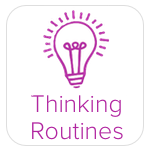- STEP 1: Demonstrate this warm up for students before they begin. Choose two students to help you with your demonstration as students will be completing this warm up in groups of three.
- STEP 2: Stand in a line with your two student partners for the demonstration, you should be at the front of the line. Begin by pantomiming a recognizable activity such as brushing teeth. Instruct the student partner standing behind you to tap you on the shoulder and ask you “What are you doing?” Respond to the student by saying any activity except the activity which you are actually miming. For example you might reply “I’m scuba diving” or “I’m walking the dog.” The partner must them immediately begin doing whatever activity has just been named.
- STEP 3: Then you will run around to the back of the line and the student partner will move to the front of the line as they continue to mime “scuba diving” or “walking the dog.” Then the student behind him/her will ask the question “What are you doing?” And the game will continue with the person in front running to the end of the line after their turn is over. Students may not repeat pantomime suggestions.
- STEP 4: Arrange students into groups of 3 and have Partner 1 being miming their activity. Cue Partner 2 to ask “What are you doing?”. Walk around the room to monitor the students and to coach their activity.
LESSON IDEA:
Try using this pantomime-based warm up as an entry point for any lesson describing a process with a series of steps. Teams of students can pantomime each step randomly and the rest of the class can place the steps in the correct order.
EXTENSION:
This warm-up specifically focuses on helping train students to stay in character and to (hopefully) get out all the giggles before starting a theater lesson. You can also use a concentration circle where one person tries to distract everyone else or “break” their concentration.
 |  |  |
